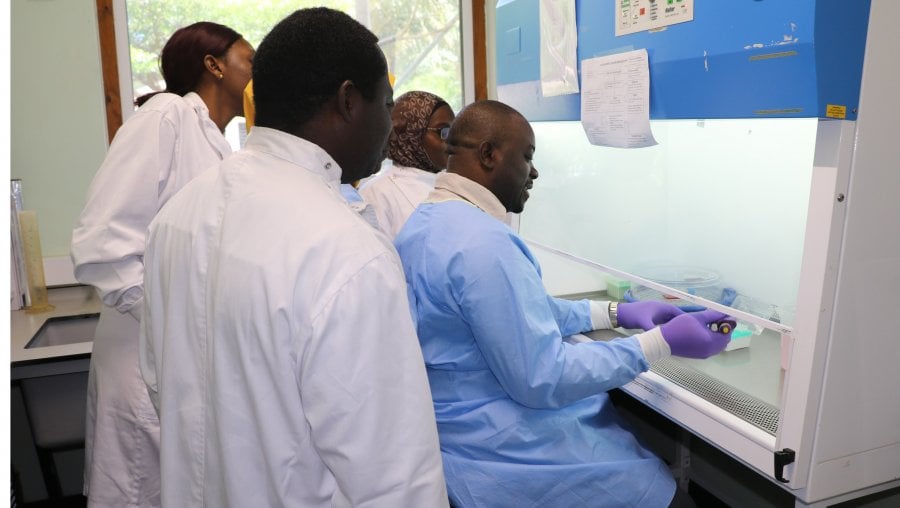Ancestral clans of malaria parasites in each region of Africa share drug resistance genes
27 August 2019 London School of Hygiene & Tropical Medicine London School of Hygiene & Tropical Medicine https://lshtm.ac.uk/themes/custom/lshtm/images/lshtm-logo-black.png
Caption: Dr Alfred Amambua-Ngwa and some of his team. Credit: MRC Unit The Gambia at LSHTM
The genetic features of these regional blocs shed new light on the way that drug resistance is emerging in different locations and moving by various routes across Africa.
The research, published in Science, was led by a team of African scientists at the MRC Unit The Gambia at the London School of Hygiene & Tropical Medicine, in collaboration with the Wellcome Sanger Institute.
The research brings together the first network of African scientists – the Plasmodium Diversity Network Africa (PDNA) – to work with genomic tools to study the diversity of malaria parasites across the continent. Whole genome sequence analysis of malaria parasites and other pathogens could pave the way for improved understanding of infections and development of new intervention approaches for elimination.
Malaria remains a global problem, with the deadliest parasite species P. falciparum prevalent across sub-Saharan Africa. Between 2000 and 2015, an ongoing drive to eliminate the disease has seen worldwide malaria deaths halve from 864,000 to 429,000 per year. The findings of this new study suggest this progress may be at risk if new forms of treatment aren’t developed.
The researchers found that regional populations of the malaria parasite are sharing genetic material in all directions – including genes that can confer resistance to antimalarial drugs, with new types of drug resistance emerging in different parts of Africa. It is thought that human migration, including that resulting from colonial activity, has played a part in the evolution of P. falciparum in Africa.
Dr Alfred Amambua-Ngwa, first author of the study, Assistant Professor at the MRC Unit The Gambia at LSHTM and a Wellcome International Fellow at the Wellcome Sanger Institute, said: “Whatever the historic factors affecting the flow of genes between the distinct P. falciparum populations, the multi-directional flow we’ve identified raises the prospect of continental spread of resistance to artemisinin-based combination therapies, which could arise from anywhere in Africa. Genomic surveillance, and on a large scale, is going to be vital to track the emergence and spread of resistance to combination therapies.”
The study included malaria samples from 15 African countries collected by the PDNA, the genomes of which were sequenced at the Wellcome Sanger Institute as part of the MalariaGEN data-sharing network. The genetic data on these samples were analysed at the MRC Unit The Gambia at LSHTM.
Using the Unit’s High Performance Computing facility, researchers combined new sophisticated software and approaches to trace ancestral connectivity between the various parasite populations, increasing the resolution of African P. falciparum parasites into genetically distinct groups according to which region of Africa they are found in.
Researchers found that the Ethiopian parasite population is highly differentiated from those in the rest of Africa, which suggests that the ancestry of malaria parasites may have been influenced by human migration. The human population in Ethiopia also has a distinct ancestry to others in Africa, suggesting that the lack of colonisation of the country might explain its outlier status. By contrast, parasites from distant former French colonies share genetic material.
Professor Umberto D’Alessandro, Director of MRC Unit The Gambia at LSHTM, said: “In this study, the local team led by Drs Amambua-Ngwa and Jeffries have demonstrated that it’s now possible to conduct sophisticated genomic analysis in Africa — turning big data into knowledge with support from our established experienced partners such as the Wellcome Sanger Institute.”
Publication
Alfred Amambua-Ngwa et al. Major subpopulations of Plasmodium falciparum in sub-Saharan Africa. Science. DOI: 10.1126/science.aav5427
If you enjoyed this article and would like to build a career in global health, we offer a range of MSc programmes covering health and data, infectious and tropical diseases, population health, and public health and policy.
Available on campus or online, including flexible study that works around your work and home life, be part of a global community at the UK's no.1 public health university.